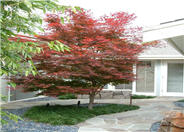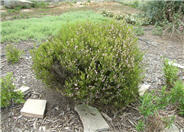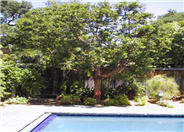
Common name:Olive, Edible Olive
Botanical name:Olea europaea
This broad tree will slowly grow to 25'-30' tall and wide. It has small, grey-green, evergreen leaves. Small white fragrant flowers bloom in spring, followed by fleshy black fruit that appears in fall. Fruit is messy and can stain sidewalks. There are cultivars that do not produce fruit. Some folks are allergic to the blooms. This tree is very long lived, with a beautiful gnarled trunk. It prefers full sun and low watering in summer months (twice a month) and none during the winter, when established.

Common name:Bloodgood Japanese Maple
Botanical name:Acer palmatum 'Bloodgood'
'Bloodgood' slowly grows to 20'-25' high and 20' wide. Deciduous, toothed, lobed leaves are red in spring and summer, changing to scarlet in fall. This popular Japanese maple needs protection from drying winds and full sun in hot summer areas. It does well in dappled shade. It needs well draining, moist, acidic soil. This is a spectacular tree all 4 seasons.

Common name:Pink Breath Of Heaven
Botanical name:Coleonema pulchellum
Pink Breath of Heaven is a finely textured wispy shrub growing 5' tall and wide, with tiny pink flowers blooming from spring through fall. Foliage is soft, needle like leaves, creating a billowy effect. It needs good drainage and can be planted in sun or part shade. It needs a medium amount of water. Plant along walkways so you can brush the foliage to release the aromatic oils.

Common name:Freeway Daisy, Trailing African Dai
Botanical name:Osteospermum fruticosum
This groundcover-small shrub will grow 1' tall, spreading 4' in a year. It has medium-size green leaves with lavender that have a dark purple center. The flower color changes to white the next day! The flowers bloom in fall and winter but in mild coastal areas, may bloom all year. It needs well draining soil. This plant looks great on a hillside or in a hanging basket.

Common name:Marina Strawberry Madrone
Botanical name:Arbutus 'Marina'
The Marina is quite easy to cultivate, with leaves that are smaller and not as glossy as the Madrone. Its flowers are pink, borne in pendant clusters in the summer. The fruit is large, red and quite ornamental. The plant should be grown in sun to partial shade, with little or no summer watering when established. The 'Marina' prefers good drainage. -Monterey Bay Nursery

Common name:Yellow Dietes or Fortnight Lily
Botanical name:Dietes bicolor
This clumping perennial iris relative stands 3'-4' high. It has light- yellow, iris-like flowers with maroon blotches that are about 2" wide. It performs best in full sun and in soil with good drainage.

Common name:Dwarf Lily of the Nile
Botanical name:Agapanthus 'Peter Pan'
This clumping dwarf variety of Agapanthus has green, strap-like, evergreen leaves. Clusters of blue, oval shaped flowers appear in summer on top of stalks, making this plant about 2' tall. This dependable plant can be grown in sun or partial sun. It is drought tolerant in coastal areas but will appreciate occasional watering in inland warm areas, especially during the summer. This perennial attracts butterflies.

Common name:Tree Roses
Botanical name:Rosa Tree varieties
Tree roses are actually shrubs that have been grafted or grown in a way that looks like a tree, ie with a trunk. Tree roses can be floribundas, hybrid teas, or grandifloras. They are typically used as specimen plants. Make sure the plant is tied to a stake in case of strong winds. They reach 3'-6' tall.
| Designer: | Beautiful Garden |
Photographer: GardenSoft |
Soils and Compost:
Incorporate compost 6" into your soil to retain water, reduce compaction, feed earthworms, and provide valuable nutrients to your plants.
Water Saving Tip:
Group plants in your garden according to their water needs (hydrozone).
Integrated Pest Management:
Remove irrigation water and fertilizer from areas where you don't want weeds to grow.
